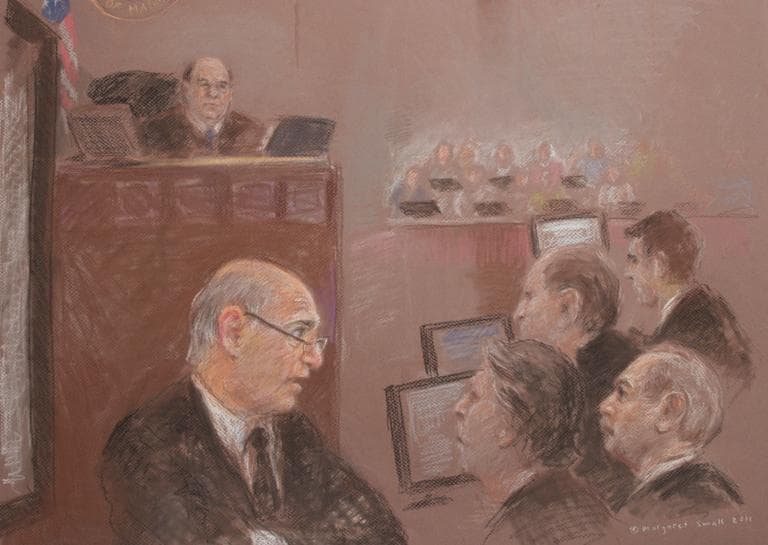Advertisement
Closing Arguments Offered In DiMasi Trial

A lawyer for former Massachusetts House Speaker Salvatore DiMasi told jurors the government's case is one of "inference upon inference upon inference."
In closing arguments Friday, William Cintolo said federal prosecutors failed to provide conclusive evidence that DiMasi and two associates received payments in exchange for DiMasi using his clout to steer two state contracts worth a combined $17.5 million to the software firm Cognos.
Earlier, prosecutor Anthony Fuller told jurors they need only use common sense to conclude that the scheme existed. Fuller said there was clear evidence that DiMasi used "official acts" that resulted in "kickbacks to his partners in crime."
“He told the jurors, ‘Use your common sense,’ ” reported WBUR’s David Boeri. “Why would they do that? Why would they try to conceal? People say those things and do those things because they know it’s wrong.”
Fuller said DiMasi violated his duty of providing honest services to the people of Massachusetts and in so doing, violated federal law.
Lawyers for DiMasi's co-defendants, Richard McDonough and Richard Vitale, also presented closing arguments Friday.
Defense lawyers have claimed payments to DiMasi were referral fees and those to McDonough and Vitale legitimate lobbyist or consulting fees.
Martin Weinberg, Vitale’s attorney, said in his closing argument the government’s case was “built on a foundation of quicksand” because it relied heavily on the testimony of former Cognos salesman Joseph Lally, who pleaded guilty in the case.
In keeping with a strategy that the defense has employed since the start of the trial, Weinberg quickly sought to discredit Lally, calling him a “self-admitted perjurer,” who cheated on his taxes and gambled away his hefty sales commissions.
Weinberg “told the jurors here at federal court, ‘We’re going to ask you to be detectives of deception.’ And immediately he homed in on what he called ‘the man without whom the government would not have a case here,’ and that’s Lally,” Boeri reported from court.
Weinberg said Lally had a motive to lie because he stood to get less time in prison and hold onto some of his assets under the plea agreement with prosecutors.
Anticipating the attack on Lally, Fuller in his closing argument readily conceded Lally was a distasteful character, but then asked jurors to consider why Lally had the cellphone number of DiMasi — arguably the most powerful figure in Massachusetts government — and frequently talked to the speaker and even played golf with him as the alleged scheme unfolded.
Fuller also told the jury that the defendants on several occasions demonstrated a “consciousness of guilt,” as details of the contracts became public, and that when asked about the allegations DiMasi lied even to members of his own staff.
“He lied because he knew if he told the truth, his goose was cooked,” Fuller said.
Weinberg said Vitale never tried to conceal payments received from Lally, nor did he try to cover up a $250,000 line of credit he extended to DiMasi, who prosecutors said was in debt as a result of losing income from his law practice after becoming speaker.
Fuller was allowed about 20 minutes for rebuttal at the end of the defense arguments.
The case is expected to go to the jury on Monday.
With reporting from The Associated Press and WBUR's David Boeri
This program aired on June 10, 2011. The audio for this program is not available.